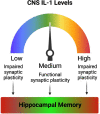The Perfect Cytokine Storm: How Peripheral Immune Challenges Impact Brain Plasticity & Memory Function in Aging
- PMID: 34631420
- PMCID: PMC8461734
- DOI: 10.3233/BPL-210127
The Perfect Cytokine Storm: How Peripheral Immune Challenges Impact Brain Plasticity & Memory Function in Aging
Abstract
Precipitous declines in cognitive function can occur in older individuals following a variety of peripheral immune insults, such as surgery, infection, injury, and unhealthy diet. Aging is associated with numerous changes to the immune system that shed some light on why this abrupt cognitive deterioration may occur. Normally, peripheral-to-brain immune signaling is tightly regulated and advantageous; communication between the two systems is bi-directional, via either humoral or neural routes. Following an immune challenge, production, secretion, and translocation of cytokines into the brain is critical to the development of adaptive sickness behaviors. However, aging is normally associated with neuroinflammatory priming, notably microglial sensitization. Microglia are the brain's innate immune cells and become sensitized with advanced age, such that upon immune stimulation they will mount more exaggerated neuroimmune responses. The resultant elevation of pro-inflammatory cytokine expression, namely IL-1β, has profound effects on synaptic plasticity and, consequentially, cognition. In this review, we (1) investigate the processes which lead to aberrantly elevated inflammatory cytokine expression in the aged brain and (2) examine the impact of the pro-inflammatory cytokine IL-1β on brain plasticity mechanisms, including its effects on BDNF, AMPA and NMDA receptor-mediated long-term potentiation.
Keywords: Biological aging; brain inflammation; cognitive decline; memory deficits; synaptic plasticity.
© 2021 – The authors. Published by IOS Press.
Conflict of interest statement
The authors have no conflict of interest to report.
Figures


Similar articles
-
Immune dysregulation and cognitive vulnerability in the aging brain: Interactions of microglia, IL-1β, BDNF and synaptic plasticity.Neuropharmacology. 2015 Sep;96(Pt A):11-8. doi: 10.1016/j.neuropharm.2014.12.020. Epub 2014 Dec 27. Neuropharmacology. 2015. PMID: 25549562 Free PMC article. Review.
-
Cognitive deficits develop 1month after diffuse brain injury and are exaggerated by microglia-associated reactivity to peripheral immune challenge.Brain Behav Immun. 2016 May;54:95-109. doi: 10.1016/j.bbi.2016.01.009. Epub 2016 Jan 14. Brain Behav Immun. 2016. PMID: 26774527 Free PMC article.
-
The Alarmin HMGB1 Mediates Age-Induced Neuroinflammatory Priming.J Neurosci. 2016 Jul 27;36(30):7946-56. doi: 10.1523/JNEUROSCI.1161-16.2016. J Neurosci. 2016. PMID: 27466339 Free PMC article.
-
Aging and an Immune Challenge Interact to Produce Prolonged, but Not Permanent, Reductions in Hippocampal L-LTP and mBDNF in a Rodent Model with Features of Delirium.eNeuro. 2018 Jun 4;5(3):ENEURO.0009-18.2018. doi: 10.1523/ENEURO.0009-18.2018. eCollection 2018 May-Jun. eNeuro. 2018. PMID: 29911174 Free PMC article.
-
Aging-related changes in neuroimmune-endocrine function: implications for hippocampal-dependent cognition.Horm Behav. 2012 Aug;62(3):219-27. doi: 10.1016/j.yhbeh.2012.02.010. Epub 2012 Feb 18. Horm Behav. 2012. PMID: 22370243 Free PMC article. Review.
Cited by
-
Post-operative cognitive dysfunction is exacerbated by high-fat diet via TLR4 and prevented by dietary DHA supplementation.Brain Behav Immun. 2024 Feb;116:385-401. doi: 10.1016/j.bbi.2023.12.028. Epub 2023 Dec 23. Brain Behav Immun. 2024. PMID: 38145855 Free PMC article.
-
Normalization of Neuroinflammation: A New Strategy for Treatment of Persistent Pain and Memory/Emotional Deficits in Chronic Pain.J Inflamm Res. 2022 Sep 9;15:5201-5233. doi: 10.2147/JIR.S379093. eCollection 2022. J Inflamm Res. 2022. PMID: 36110505 Free PMC article. Review.
-
Impact of high-fat diet on cognitive behavior and central and systemic inflammation with aging and sex differences in mice.Brain Behav Immun. 2024 May;118:334-354. doi: 10.1016/j.bbi.2024.02.025. Epub 2024 Feb 24. Brain Behav Immun. 2024. PMID: 38408498
-
Selective TLR4 Antagonism Prevents and Reverses Morphine-Induced Persistent Postoperative Cognitive Dysfunction, Dysregulation of Synaptic Elements, and Impaired BDNF Signaling in Aged Male Rats.J Neurosci. 2023 Jan 4;43(1):155-172. doi: 10.1523/JNEUROSCI.1151-22.2022. Epub 2022 Nov 16. J Neurosci. 2023. PMID: 36384680 Free PMC article.
-
Association of Vitamin C, Thiamine, and Hydrocortisone Infusion With Long-term Cognitive, Psychological, and Functional Outcomes in Sepsis Survivors: A Secondary Analysis of the Vitamin C, Thiamine, and Steroids in Sepsis Randomized Clinical Trial.JAMA Netw Open. 2023 Feb 1;6(2):e230380. doi: 10.1001/jamanetworkopen.2023.0380. JAMA Netw Open. 2023. PMID: 36853612 Free PMC article. Clinical Trial.
References
-
- Rozovsky I, Finch CE, Morgan TE. Age-related activation of microglia and astrocytes: in vitro studies show persistent phenotypes of aging, increased proliferation, and resistance to down-regulation. Neurobiol Aging. 1998;19(1):97–103. - PubMed
-
- D’Mello C, Swain MG. Immune-to-Brain Communication Pathways in Inflammation-Associated Sickness and Depression. In: Dantzer R, Capuron L. (eds) Inflammation-Associated Depression: Evidence, Mechanisms, and Implications. CurrentTopics in Behavioral Neurosciences, vol. 31. Springer, Cham; 2016. doi: 10.1007/7854_2016_37 - DOI - PubMed
Publication types
Grants and funding
LinkOut - more resources
Full Text Sources
